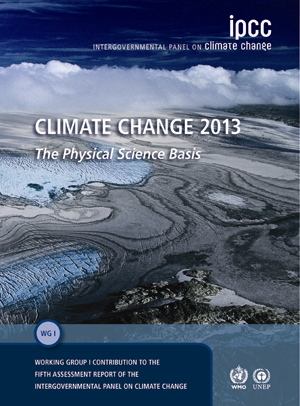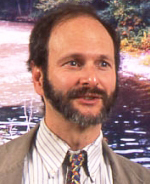By Karl Coplan
Karl Coplan is a professor of law at Pace Law School and co-director of its Environmental Litigation Clinic. This post also appears on GreenLaw, the blog of the Pace Environmental Law Program. More on Karl at the conclusion of this post.
 The Fifth Assessment Report is out from the Intergovernmental Panel on Climate Change (IPCC). No real surprises — the Earth has warmed, is warming, and will warm, the oceans are acidifying and human beings are in fact responsible for these changes due primarily to carbon emissions from fossil fuels.
The Fifth Assessment Report is out from the Intergovernmental Panel on Climate Change (IPCC). No real surprises — the Earth has warmed, is warming, and will warm, the oceans are acidifying and human beings are in fact responsible for these changes due primarily to carbon emissions from fossil fuels.
What is new is that the IPCC sets a carbon budget for planetary survival. Pace Academy’s Andy Revkin has an excellent summary on his DotEarth blog. An excerpt:
For decades to come, we’re locked into generally rising temperatures, with shorter-term temperature shifts* — up or down — shaped most by natural variability in the system (as with the recent plateau in temperatures). But humanity, by acting in ways that blunt emissions of greenhouse gases, can significantly affect the rate of warming and other related conditions from mid century onward. That’s a time scale that people can reasonably understand. Energy and environmental policies being considered now can matter not just to great grandchildren, but to many global citizens alive today.
In order to have a 66% chance of avoiding catastrophic climate change in excess of 2 degrees C, the planet is limited to a total of one trillion tons total carbon emissions since the dawn of the industrial revolution. From the IPCC report:
Limiting the warming caused by anthropogenic CO2 emissions alone with a probability of >33%, >50%, and >66% to less than 2°C since the period 1861–1880, will require cumulative CO2 emissions from all anthropogenic sources to stay between 0 and about 1560 GtC, 0 and about 1210 GtC, and 0 and about 1000 GtC since that period respectively. These upper amounts are reduced to about 880 GtC, 840 GtC, and 800 GtC respectively, when accounting for non-CO2 forcings as in RCP2.6. An amount of 531 [446 to 616] GtC, was already emitted by 2011.
Since we have already burned 531 gt of carbon, that trillion ton carbon budget leaves only 470 gt left for humanity to burn. Ever.
Avoiding catastrophe is going to require an outright ban on burning fossil fuels.
So it turns out that Bill McKibben (who has been tirelessly popularizing the no-more-than 565 gt through 2050 figure from his Rolling Stone article) is too optimistic about how much carbon we can burn. As I pointed out in a previous post, that 565 gt figure leads to a sustainable direct individual carbon footprint of just one ton per year — the equivalent of driving a Prius 5000 miles, taking one cross country flight, or a small fraction of the energy consumed by even the most energy efficient single family house in the US. The Fifth IPCC Report suggests that one ton per capita per year globally is too much for planetary survival.
The IPCC points out that the globe is on track to pass the one trillion ton cumulative limit by 2040. In terms of legal response, I think that the time for market incentives and regulatory approaches to limit carbon is rapidly slipping by. Avoiding catastrophe is going to require an outright ban on burning fossil fuels. Such bans are not unheard of at law, with varying degrees of success — the Endangered Species Act all but bans takings of endangered species and the Convention on International Trade in Endangered Species all but bans their trade. Prohibition sought to ban all intoxicating liquor, but with limited success.
I am beginning to think the best analog for a response to global climate change is the abolition of slavery — it took two centuries and (domestically) a civil war, but slavery went from being a global economic norm to being nearly universally outlawed, condemned and banished globally. We need to reach the same place as far as burning fossil fuels goes, and we have a scant two decades, not two centuries, to get there.
«« »»
 Karl S. Coplan has been a Professor and Associate Professor of Law at Pace Law School and Co-Director of its Environmental Litigation Clinic since 1994. As the principal outside counsel for Riverkeeper, Inc., Professor Coplan and the Pace Environmental Litigation Clinic have brought numerous lawsuits enforcing the Clean Water Act and other environmental laws.
Karl S. Coplan has been a Professor and Associate Professor of Law at Pace Law School and Co-Director of its Environmental Litigation Clinic since 1994. As the principal outside counsel for Riverkeeper, Inc., Professor Coplan and the Pace Environmental Litigation Clinic have brought numerous lawsuits enforcing the Clean Water Act and other environmental laws.
Prior to joining the Pace faculty, he practiced land use and environmental litigation for eight years with the New York City firm of Berle, Kass & Case. Before entering private practice, Professor Coplan clerked for The Honorable Warren E. Burger, Chief Justice of the United States, and The Honorable Leonard I. Garth, Circuit Judge of the United States Court of Appeals for the Third Circuit. Read his full bio here.









